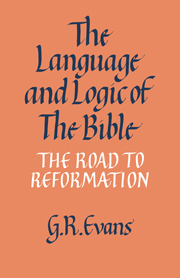6 - The ground rules
from II - The rules of interpretation
Published online by Cambridge University Press: 12 October 2009
Summary
In 1433 at the Council of Basle John of Ragusa gave a series of rules for the interpretation of Scripture: the whole of Scripture may be taken to be inspired by the Holy Spirit. Nothing it asserts definitely or explicitly (positum, expressum) can deceive or mislead. The teaching of Scripture is in accordance with divine goodness. Scripture has many senses, of which the literal sense is the principal one, and contains within it the figurative sense. The literal sense is the sense the author intended. It is infallible. It contains everything necessary to salvation. When he is trying to understand a passage, the reader should look at what comes before it and after it. He should ask what kind of material the text contains. Difficulties in the text are useful and necessary. However, they make it necessary for Scripture to be expounded. Of earlier interpreters the Fathers (Jerome, Ambrose, Augustine, Gregory) are to be preferred to the moderns. Commentators should be compared and reduced to agreement if possible. If that cannot be done, the one closest to Scriptural truth is to be preferred. Heretics have interpreted Scripture falsely. The aim of all interpretation is to arrive at the truth.
Juxtaposed in this list are principles which would have appeared in a list made by Augustine, or by Peter Lombard in the twelfth century, and principles which had come to be established only very recently, within the century and a half or two centuries before John of Ragusa's lifetime.
- Type
- Chapter
- Information
- The Language and Logic of the BibleThe Road to Reformation, pp. 39 - 41Publisher: Cambridge University PressPrint publication year: 1985



